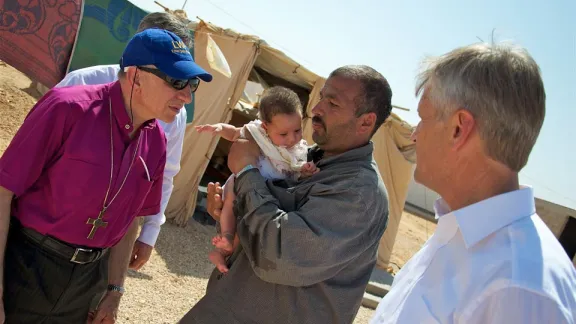
LWF President Bishop Dr Munib A. Younan (left) and LWF General Secretary Rev. Martin Junge (right) meet Nabeel, one of the children who make up 52 percent of Zaâatriâs population, during a visit to the camp in late September. © LWF/Thomas Ekelund
LWF Urges Scaling Up of Aid Efforts for Basic Dignity
Winter is coming. And even though the late September sky offers no shade from the scorching sun and the drifting dust is a merciless reminder of the Jordanian desert, the months to come mean drastic changes. The 32 degrees Celcius will rapidly drop to single digits below zero at night, and the dust will turn into mud on rainy days.
Za’atri camp in northern Jordan is 70 kilometers from the Syrian border. The number of Syrians fleeing the intensifying conflict at home into neighboring countries has been increasing dramatically over the past three months. By late September the United Nations High Commissioner for Refugees (UNHCR) had registered 94,716 people in Jordan, which is now hosting the highest numbers, followed by Turkey and then Lebanon.
The Jordanian government has given the Jordan Hashemite Charity Organization (JHCO), the largest non-governmental organization (NGO) in the country, the mandate to manage the camp. This is a difficult and challenging task, which, according to the JHCO, depends on international support.
Providing for Children
“We have nothing but the clothes we wore when we fled for our lives,” says Mashur, glancing with worried eyes at his two boys. “And I have nothing to offer my children when the cold is here.” The carpenter from southern Syria says he fled to Za’atri camp one and a half months ago, escaping the military that was threatening to kill him. “We had to leave everything for absolutely nothing.”
In between the row of heavy trucks entering the camp to supply 1 million liters of water per day, hundreds of tents, prefab containers and machinery, a dozen children are trying to play football. Many of them are dressed in light clothes, few have shoes. There is very little for them to do and the restlessness often ends up in quarrels and fighting.
Basic Dignity
The Lutheran World Federation (LWF), a founding member of the ACT Alliance, has recently started offering emergency assistance in Za’atri with the primary aim to provide shelter and clothing for children, as winter now hastily approaches. Here, 52 percent of the refugees are below the age of eighteen.
Under a memorandum of understanding with the JHCO, the LWF will provide the refugees with winterized tents, prefab containers and warm garments for 10,000 children. The focus will be broadened in the coming months to include assistance to refugees in organizing community-based groups at the camp.
An LWF delegation comprising LWF President Bishop Dr Munib A. Younan and General Secretary Rev. Martin Junge visited Za’atri camp on 27 September and witnessed firsthand the conditions there and the humanitarian response supported by the global Lutheran communion.
Junge said he was impressed by how the different NGOs are working together. But he noted, the needs are there and it takes great efforts to overcome the challenges.
“We are facing difficulties and hardship. I see traumatized people that have escaped violence, and how violence is shaping the way people relate to the situation. Fifty two percent of the population here are children, facing a winter soon to come with low temperatures and rain,” he said.
“We will have to scale up our efforts jointly so that people can live in basic dignity,” Junge added.
Others on the delegation are Rev. Eberhard Hitzler, director of the Department for World Service (DWS), the LWF’s humanitarian relief arm; and Rev. Mark Brown, who heads the Jerusalem-based DWS operations for the Middle East region.
The group’s itinerary until 30 September includes a visit to the LWF-run Augusta Victoria Hospital in East Jerusalem, and meetings with ecumenical leaders and with the Palestinian Prime Minister Dr Salam Fayyad.
Long Experience in Jordan
The LWF has a long experience in refugee situations and engagement in the region. By the end of 1951, its Jerusalem program, with over 400 employees, was one of the largest employers in the Hashemite Kingdom of Jordan, behind only the United Nations Relief and Works Agency (UNRWA) for Palestinian refugees and the government itself.
When the region experienced drought from 1958 to 1962, the Jordanian government appealed to the LWF to distribute food, especially flour, to Bedouin communities at risk of starvation. Over a period of three years, nearly 5 million pounds of flour was distributed to more than 179,000 people.
Looking to the end of 2012, the UN plans to assist up to 700,000 Syrian refugees at a total cost of USD 488 million, with the LWF’s involvement in Jordan at USD 950,000. It is estimated that Jordan will be hosting 250,000 Syrians by the end of the year. The government puts the current numbers at 180,000, but says not all are in need of protection.
(Written for LWI by Thomas Ekelund in Za’atri, Jordan)


